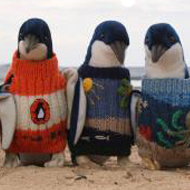
How best knits help oil spill birds
Jumpers have been knitted for little penguins affected by oil spills in Australian to stop them preening and swallowing toxins.
The Phillip Island Penguin Foundation which launched a Knit for Nature programme, said: "A patch of oil the size of a thumb nail can kill a little penguin.
"Oiled penguins often die from exposure and starvation.
"Oil separates and mats feathers, allowing water to get in which makes a penguin very cold, heavy and less able to successfully hunt for food."
The jumpers are placed on the penguins to stop them preening while they wait to be washed by clinic staff.
Phillip Island is home to an estimated 32,000 little penguins.
The last major oil spill off the island happened in 2001 and affected 453 little penguins – 96 per cent of them were saved and rehabilitated at the Phillip Island Wildlife Clinic before being released back into the wild.
The foundation recently ran a knitting competition and said it has been overwhelmed with offers of jumpers from around the world, so much so that it is able to send the jumpers on to other rescue centres if required.
In 201/13 582 sick animals were admitted to the Phillip Island Wildlife Clinic of which 141 were little penguins.
The foundation raises funds for the rescue and care of sick or injured little penguins. It also runs an adopt a penguin programme.



 The RCVS has announced a new version of its 1CPD mobile app, with enhanced features for veterinary surgeons and veterinary nurses to record their continuing professional development.
The RCVS has announced a new version of its 1CPD mobile app, with enhanced features for veterinary surgeons and veterinary nurses to record their continuing professional development.